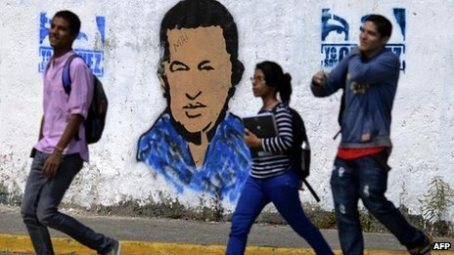Assessing Hugo Chávez 1954-2013
If you’re finding it tricky to assess the late Hugo Chávez’s 14-year stewardship of Venezuela, then the work of expert journalists who met the man and visited his country won’t necessarily help. Jon Lee Anderson’s blog for the New Yorker was a masterpiece of ambivalence. The New Statesman recently ran the case for the defence (by Richard Gott) alongside the case for the prosecution (by Rory Carroll, still less hostile than most of the current coverage in the US media). At the risk of sounding like The Fast Show’s Indecisive Dave, you could come away believing that both portraits were true yet incomplete.
Chávez’s presidency cries out for both/and rather than either/or analysis. In the life of this passionate, flamboyant, provocative character, success and failure don’t meet in the middle but create a balance of extremes. He reduced poverty (the number living in extreme poverty went from 23.4% to 8.5%; unemployment halved) and poured oil money into education and healthcare but he left Caracas a failed city with crumbling infrastructure and one of the highest murder rates in the world. Working with other populist leaders on the continent, he made Latin America stronger and more self-confident but he was a loyal friend to tyrants and continued to offer unwavering support to Gaddafi and Assad even as they murdered protesters. He introduced a progressive constitution and survived a US-endorsed right-wing coup without resorting to the extreme measures that blighted Latin America in the 70s and beyond, but also centralised power, eroded human rights and intimidated opponents (although not on the scale that his critics would have us believe). And so on.
Such titanic complexity is great if you want to write a Shakespearean tragedy but not so useful if you want to make a political case. For commentators (rather than reporters) on the left and right, there is a lot riding on Chávez’s legacy and nuance is the first casualty. You will read countless times that Chávez was a champion of the underdog and a vital counterbalance to the US-led neoliberal consensus. You will also read that he was an autocratic buffoon whose ambitions far outstripped his competence.
His critics have a hard time accepting that he genuinely won four elections, either questioning the integrity of the results or the intellect of the voters, unable to accept poor Venezuelans’ sincere love for a leader who actually cared about them. They also show considerably more concern for Chávez’s human rights abuses than they ever did for those of the regimes that did far worse things across Latin America, Venezuela included, with the west’s blessing during the Cold War. If only Pinochet had attracted half the opprobrium, but of course he wasn’t a socialist. Overcorrecting this bias, supporters on the left are prone to handwave his human rights record, support for dictators and various economic failures. Give an inch in this argument and your opponents will take a mile.
But the validity of left-wing populism doesn’t stand or fall with Chávez. As Jon Lee Anderson writes, “Brazil’s last leader, Lula, who was also a left-wing populist, also made ‘the people’ and poverty alleviation a priority of his Administration, and, with a better management team and without all the polarizing confrontation with the imperio, he succeeded to an impressive degree. In Venezuela, by contrast, Chávez’s revolution suffered from mediocre administrators, ineptitude, and a lack of follow-through.”
And there is no need for the left to make excuses for Chávez’s sins. Noam Chomsky was a friend and supporter of the president but nonetheless pointed out where his autocratic excesses fell short of his Bolivarian ideals, telling the Observer in 2011: “Concentration of executive power, unless it’s very temporary and for specific circumstances, such as fighting world war two, is an assault on democracy. You can debate whether [Venezuela's] circumstances require it: internal circumstances and the external threat of attack, that’s a legitimate debate. But my own judgment in that debate is that it does not.”
Unlike the mass of colourless and compromised world leaders, Chávez was a genuinely important, gamechanging character whose presidency resists simplistic labels. Rather than fighting to persuade people that he was either one thing or the other, his critics could learn something from his tremendous strengths and his defenders could draw lessons from his considerable flaws. That would be a legacy worth shouting about.


Dorian Lynskey's Blog
- Dorian Lynskey's profile
- 64 followers




